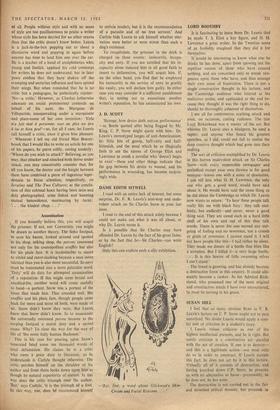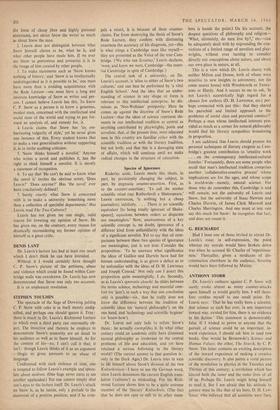SUSAN HILL I feel that so many obvious flaws in
F. R. Leavis's lecture on C. P. Snow ought not to pass unnoticed. No doubt Leavis would apply a simi- lar sort of criticism to a student's essay.
1. Leavis values criticism as one of the highest intellectual pursuits, and he is right. But surely criticism is a constructive act—parallel with the act of creation. If one is to destroy— and this is a legitimate action—one must only do so in order to construct. If Leavis accepts this fact, he does not act by it in this lecture. Virtually all of it consists of destruction, and having knocked down C.P. Snow, he presents us with no alternative to Snow—presumably, as he does not, he has none.
The destruction is not carried out in the fair and detached critical manner, but proceeds in the form of cheap jibes and highly personal statements, not about Snow the writer so much as about Snow the man.
2. Leavis does not distinguish between what Snow himself claims to be, what he is, and what other people have made him. If we ever see Snow as portentous and pompous it is in the image of him created by other people.
3. To make statements such as 'Snow knows nothing of history,' and 'Snow is as intellectually undistinguished as it is possible to be,' one must have more than a nodding acquaintance with the Rede Lecture—one must have a long and intimate knowledge of Snow as writer and per- son. I cannot believe Leavis has this. To know C. P. Snow as a person is to know a generous, modest man, concerned with the intellectual and social state of the world and trying to put for- ward an analysis of, and remedy for, it.
4. Leavis claims that Snow has 'an em- barrassing vulgarity of style,' yet he never gives one instance of this. Every student knows that to make a vast generalisation without supporting it, is to invite scathing criticism.
5. 'Snow thinks himself a novelist.' Anyone who writes a novel and publishes it, has the right to think himself a novelist. It is merely a statement of occupation.
6. To say that 'He can't be said to know what the novel is' invites the obvious retort, 'Does Leavis?' Does anyone?' Has 'the novel' ever been conclusively defined?
7. Surely exactly what Snow is concerned with is to make a university 'something more than a collection of specialist departments.' Has Leavis read The Two Cultures?
Leavis has not given me one single, valid reason for lowering my opinion of Snow. He has given me, on the contrary, every reason for drastically reconsidering my former opinion of himself as a great critic.



































 Previous page
Previous page